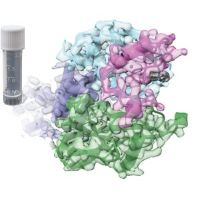Specification
| Description | Recombinant protein from the full-length sequence of Homo sapiens inositol polyphosphate multikinase (IPMK) (NM_152230). |
| Organism | Homo sapiens (Human) |
| Expression Host | Human Cells |
| Tag Info | His or DYKDDDDK. Please contact us if you need further information or require specific designed tag. |
| Purity | Greater than 90% by SDS-PAGE gel |
| Uniprot ID | Q8NFU5 |
| Entry Name | IPMK_HUMAN |
| Gene Names | IPMK IMPK |
| Alternative Gene Names | IMPK |
| Alternative Protein Names | Inositol polyphosphate multikinase (EC 2.7.1.140) (EC 2.7.1.151) (EC 2.7.1.153) (Inositol 1,3,4,6-tetrakisphosphate 5-kinase) |
| Application | Antigens, Western, ELISA and other in vitro binding or in vivo functional assays, and protein-protein interaction studies; For research & development use only! |
| Buffer | Purified protein formulated in a sterile solution of PBS buffer, pH7.2, without any preservatives |
| Endotoxin | Endotoxin level is < 0.1 ng/µg of protein (<1EU /µg) |
| Length | 416 |
| Molecular Weight(Da) | 47222 |
| Protein Sequence | (The sequence of expressed protein may have some variation from the sequence shown below. Please contact us for the exact sequence.) MATEPPSPLRVEAPGPPEMRTSPAIESTPEGTPQPAGGRLRFLNGCVPLSHQVAGHMYGKDKVGILQHPDGTVLKQLQPPPRGPRELEFYNMVYAADCFDGVLLELRKYLPKYYGIWSPPTAPNDLYLKLEDVTHKFNKPCIMDVKIGQKSYDPFASSEKIQQQVSKYPLMEEIGFLVLGMRVYHVHSDSYETENQHYGRSLTKETIKDGVSRFFHNGYCLRKDAVAASIQKIEKILQWFENQKQLNFYASSLLFVYEGSSQPTTTKLNDRTLAEKFLSKGQLSDTEVLEYNNNFHVLSSTANGKIESSVGKSLSKMYARHRKIYTKKHHSQTSLKVENLEQDNGWKSMSQEHLNGNVLSQLEKVFYHLPTGCQEIAEVEVRMIDFAHVFPSNTIDEGYVYGLKHLISVLRSILDN |
Background
| Function | FUNCTION: Inositol phosphate kinase with a broad substrate specificity (PubMed:12027805, PubMed:12223481, PubMed:28882892, PubMed:30420721, PubMed:30624931). Phosphorylates inositol 1,4,5-trisphosphate (Ins(1,4,5)P3) first to inositol 1,3,4,5-tetrakisphosphate and then to inositol 1,3,4,5,6-pentakisphosphate (Ins(1,3,4,5,6)P5) (PubMed:12027805, PubMed:12223481, PubMed:28882892, PubMed:30624931). Phosphorylates inositol 1,3,4,6-tetrakisphosphate (Ins(1,3,4,6)P4) (PubMed:12223481). Phosphorylates glycero-3-phospho-1D-myo-inositol 4,5-bisphosphate to glycero-3-phospho-1D-myo-inositol 3,4,5-trisphosphate (PubMed:30420721, PubMed:28882892). Plays an important role in MLKL-mediated necroptosis via its role in the biosynthesis of inositol pentakisphosphate (InsP5) and inositol hexakisphosphate (InsP6). Binding of these highly phosphorylated inositol phosphates to MLKL mediates the release of an N-terminal auto-inhibitory region, leading to activation of the kinase. Essential for activated phospho-MLKL to oligomerize and localize to the cell membrane during necroptosis (PubMed:29883610). Required for normal embryonic development, probably via its role in the biosynthesis of inositol 1,3,4,5,6-pentakisphosphate (Ins(1,3,4,5,6)P5) and inositol hexakisphosphate (InsP6) (By similarity). {ECO:0000250|UniProtKB:Q7TT16, ECO:0000269|PubMed:12027805, ECO:0000269|PubMed:12223481, ECO:0000269|PubMed:28882892, ECO:0000269|PubMed:29883610, ECO:0000269|PubMed:30420721, ECO:0000269|PubMed:30624931}. |
| Pathway | Phospholipid metabolism; phosphatidylinositol metabolism. |
| Protein Families | Inositol phosphokinase (IPK) family |
| Tissue Specificity | Ubiquitous, with the highest expression in skeletal muscle, liver, placenta, lung, peripheral blood leukocytes, kidney, spleen and colon. {ECO:0000269|PubMed:12223481}. |
QC Data
| Note | Please contact us for QC Data |
| Product Image (Reference Only) |  |

